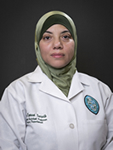These grants are selected by the ATA®Research Committee, approved by the ATA Board of Directors and awarded by the American Thyroid Association. Administrative management, marketing, financial and grant tracking support organized and provided by the ATA Headquarters’ office.
Research awardees are honored at the ATA Annual Meeting and on the ATA website with additional presentations and recognition on the ATA annual meeting program. Grant funding generously provided by Bite Me Cancer.
2024 Bite Me Cancer and ThyCa Research Grant
 Thomas Szabo Yamashita, MD, Assistant Professor, Emory School of Medicine
Thomas Szabo Yamashita, MD, Assistant Professor, Emory School of Medicine
Environmental Chemicals in Human Thyroid Carcinomas
Dr. Szabo Yamashita’s research focuses on studying the impact of environmental toxicant exposure in the development of thyroid cancer, assessing histopathologic changes and their impact on the clinical manifestation of thyroid cancer.
Thomas Szabo Yamashita is an Assistan Professor of Surgery at Emory School of Medicine. He was born and raised in Brazil where he finished his medical school. After finishing his general surgery residency at the Mayo Clinic in Minnesota, he finished his Endocrine Surgery training at the University of Texas MD Anderson Cancer Center. He is an academic surgeon with multiple research interests. Thyroid Disease, specifically Thyroid Cancer has been an important area of his research, including different aspects of diagnostics and therapeutics of medullary thyroid cancer, socio-demogrpahic differences in state and nation-wide cancer databases and health-related life quality in thyroid cancer. He is a new ATA member and enthusiast. As a recent academic surgeon at the Emory School of medicine he has bene working on a pilot project with novel concept of exposomics in thyrdoi cancer. This project is looking specifically at the exposure of environmenal chemicals in the development and clinical rpofile of associated differentiated thyroid cancers.
Thomas Szabo Yamashita Bite Me Cancer and ThyCa Research Award Acceptance Video
2022 Bite Me Cancer
 Shoko Kure, MD, PhD – Post-doctoral fellow. Beth Israel Deaconess Medical Center, Harvard Medical School, Brookline, MA, United States
Shoko Kure, MD, PhD – Post-doctoral fellow. Beth Israel Deaconess Medical Center, Harvard Medical School, Brookline, MA, United States
Basic – Medullary Thyroid Cancer
Unraveling pericyte function and lineage in medullary thyroid cancer milieu
Dr. Kure’s research focuses on assessing the pericyte lineage and functional diversity in the MTC microenvironment. The ultimate goal is to develop novel effective targeted combined therapies for patients with MTC.
Shoko Kure MD/PhD has a background in diagnostic pathology and cytology, molecular and experimental pathology, PhD in Medicine (including skills in molecular and cellular biology, pathology and bioinformatics). She researched thyroid cancer after Chernobyl accident in her medical school. After the clinical residency in Endocrinology and endocrine surgery, she became junior faculty member in the Department of Pathology at Nippon Medical School (Japan), she has researched the molecular profile of the thyroid cancers by analyzing 1,200 cases with 25-year follow-up data, collaborating with Prof. Iwao Sugitani (Department of Endocrine Surgery, Nippon Medical School, Japan), Dr. Mitsuyoshi Hirokawa (Department of Pathology, Kuma Hospital, Japan), and Dr. Kengo Takeuchi (Department of Pathology/Cancer Institute Hospital, Japan), and published several peer-reviewed papers. She worked as a boarded surgical pathologist over the last 5 years, diagnosing thyroid cancer (150 cases/year). She delivered lectures in basic science including thyroid cancer at medical school. She is a co-author of a textbook of pathology. Currently, she is post-doctoral research fellow in Dr. Carmelo Nucera preclinical thyroid cancer research lab (Beth Israel Deaconess Medical Center, Harvard Medical School, Boston, USA). She is studying tumor microenvironment of medullary thyroid cancer by the mentorship of Dr. Carmelo Nucera in his lab spaces. She is a new member of the ATA, declaring that she will dedicate herself to this research for long-term commitment, provide effort and passion to the ATA, and intensely contribute to MTC and other types of thyroid cancer research for new innovative treatment and diagnostic methods.
Shoko Kure Bite Me Cancer Research Award Acceptance Video
2021 Bite Me Cancer
 Eman Toraih, MD, PhD, MS – Associate Professor, New Orleans, Louisiana, United States
Eman Toraih, MD, PhD, MS – Associate Professor, New Orleans, Louisiana, United States
Thyroid Cancer
miR-145/MMP9 ratio for prediction of recurrence in thyroid cancer
Dr. Toraih research focuses on developing and validating highly-sensitive blood tests that rely on nanotechnology-based strategies to find previously undetectable biomarkers of thyroid cancer that has the potential to improve countless lives and transform medicine.
Eman Toraih, MD, PhD, is an Assistant Professor of Medical Genetics, Department of Surgery, Tulane University, School of Medicine. Dr. Toraih received her undergraduate (2002) and Medical genetics master (2008) and doctorate (2014) degrees from Suez Canal University. She was teaching Molecular Genetics and Cancer Genomics to medical students. She worked as a head of Molecular lab in the Center of Excellence of Molecular and Cellular Medicine, founded in 2015. Her research focused on translational cancer biology and has presented her work in various local and international conferences where she received numerous awards. She conducted sizable projects on cancer, two of which focused on the genetic landscape of brain and breast cancer patients. Her current research work focuses on the identification of novel markers for thyroid cancer. In her lab, they are performing a range of in vivo, in vitro, and human studies to investigate the trafficking partners of nuclear mutant BRAF and causal regulatory network leading to treatment resistance. Toraih recently developed a predictive signature and nomogram for accurate selection of active surveillance in thyroid cancer patients. She has published over 110 articles and three books and have served on numerous editorial boards of peer-reviewed journals.
Eman Toraih Bite Me Cancer Research Award Acceptance Video
 2020 Bite Me Cancer
2020 Bite Me Cancer
Discovering novel molecular nodes involved in MTC development and evolution
Cristina Montero-Conde, PhD – Spanish National Cancer Research Center (CNIO), Madrid, Spain
Dr. Cristina Montero-Conde started her scientific career in the laboratory of Hereditary Endocrine Cancer headed by Dr. Mercedes Robledo at the Spanish National Cancer Research Center (CNIO). In this period, she received the Genzyme Prize from the Spanish Society of Endocrinology and Nutrition (SEEN) and was a Finalist for the Sergio Vidal Prize for Young Investigators in Biomedicine (Spain) for her contributions to thyroid cancer research. After obtaining her Ph.D., she moved to Dr. Pilar Santisteban’s laboratory at CSIC (Madrid, Spain) for a short stay gaining experience in molecular biology and biochemistry techniques. In 2009, Cristina joined Dr. James Fagin´s laboratory at Memorial Sloan-Kettering Cancer Research Center (MSKCC) in New York. Her postdoctoral work focused on the characterization of resistance mechanisms to RAF and MEK kinase inhibitors. Cristina discovered that resistance determinants vary among cancer types due to preferential self-regulation of specific RTKs, and critically on the autocrine expression or abundance of their respective ligands. The work was published in Cancer Discovery (2013) and prompted an editorial and extensive coverage in other journals. She also received the 2011 Endocrine Society Presidential Poster Award. Cristina returned to the CNIO in 2014, and obtained a senior postdoctoral research grant from the Spanish Association for Cancer Research (AECC) in 2015. She has been steadily productive and her research currently focuses on the identification and characterization of the molecular hallmarks of medullary and follicular cell-origin thyroid cancer through genomic strategies, with special interest in those with a therapeutic application.
 2019 Bite Me Cancer
2019 Bite Me Cancer
Targeting Mitochondrial Cytochrome-C-Oxidase for The Treatment of MTC
Athanasios Bikas, MD – MedStar Georgetown University Hospital, Washington, DC
Dr. Athanasios Bikas graduated from the University of Athens Faculty of Medicine in 2012. His interest in the endocrine system was apparent from the early years of medical school. After graduation, he started working towards his PhD in Molecular Biology from the University of Athens. He pursued a post-graduate research fellowship in Thyroid Cancer under the supervision of Dr. Kenneth Burman, Dr. Leonard Wartofsky and Dr. Vasyl Vasko. He pursued both clinical and basic research projects. He has several first author publications in journals like Thyroid and JCEM. He has been awarded several awards regarding his work on a regional and national level. He then completed his medical residency at MedStar Georgetown University Hospital in 2019. He was honored with a Chief Medical Resident position and he is going to serve in that role until 07/2020. His future goals include a clinical and research fellowship in Endocrinology, and a physician-scientist position in the field of Thyroid Cancer.
 2018 Bite Me Cancer
2018 Bite Me Cancer
Proteomic led discovery of essential genes in Medullary Thyroid Cancer
Wayne Miles, Ph.D. – The Ohio State University, Columbus, OH
Dr. Wayne Miles of the Ohio State University Comprehensive Cancer Center was award a 2018 thyroid cancer research grant for the project titled: “Proteomic led discovery of essential genes in Medullary Thyroid Cancer” by the American Thyroid Association. Dr. Miles completed his undergraduate education at Massey University in New Zealand before moving to the University of Manchester (UK) for his graduate training. He then completed his Post-Doctoral fellowship at the Massachusetts General Hospital Cancer Center and Harvard Medical School researching the mechanisms that enable cancer cells lacking the Retinoblastoma 1 (RB) tumor-suppressor gene to survive. He then moved to the Ohio State University Comprehensive Cancer Center in 2016. Dr. Miles’ research focuses on understanding how loss of the Retinoblastoma 1, RB, tumor-suppressor gene and its upstream regulators contribute to cancer growth. More recently, his research has expanded to investigate the roles of RB-inactivation in Medullary Thyroid Cancer, as this disease represents a unique place to study RB-regulation. This is because: (1) RB-inactivation caused by CDKN2C loss is the strongest prognostic marker of poor outcome for MTC patients and (2) RB1-/- mice develop aggressive MTC. Building on Dr. Miles’ proteomic profiling of MTC cells lines. In this project, the Miles lab will couple large scale omics profiling and CRISPR to determine; (1) the composition of the murine MTC tumor proteome and (2) which proteins are essential for human MTC cell line survival.
 2017 Bite Me Cancer
2017 Bite Me Cancer
Novel Alternative Pathways and Mutational Hotspots in Papillary Thyroid Cancer with Acquired Resistance to BRAF Inhibitors
Brian P Danysh, PhD – The University of Texas MD Anderson Cancer Center, Houston TX
Dr. Brian Danysh of the University of Texas MD Anderson Cancer Center was awarded a 2017 thyroid research grant for the project titled “Novel Alternative Pathways and Mutational Hotspots in Papillary Thyroid Cancer with Acquired Resistance to BRAF Inhibitors” by the American Thyroid Association. The grant is awarded by the ATA Research Committee, chaired by Dr. Motoyasu Saji, approved by the ATA Board of Directors and administered by the ATA Headquarters’ office. Administrative and grant tracking support provided by the ATA. Research awardees are honored at the ATA Annual Meeting and on the ATA website with additional presentations and recognition on the ATA annual meeting program. Grant funding was generously provided by Bite Me Cancer. Dr. Danysh’s earliest contributions to science emerged from the confluence of his interests in cellular and extracellular matrix biology, which he acquired during his graduate studies at the University of Delaware and his interests in translational cancer research, which he developed during his postdoctoral trainings at Rice University and MD Anderson Cancer Center. Throughout his trainings, he has cultivated collaborations with scientists and clinicians to develop novel approaches to scientific and therapeutic challenges. At Rice University, he used nanotechnology to exploit aberrant mucin expression in endometrial carcinoma, delivering targeted nanoparticles and laser irradiation to selectively destroy cancer cells. The project, which required a collaboration with physicists, demonstrated mucins as promising therapeutic targets. His current research involves a collaboration with clinicians and examines mechanisms of acquired inhibitor resistance. He is studying the genetic and epigenetic modifications that occur in PTC cells that allow them to escape sensitivity to BRAF inhibitors. His most recent publication describes BRAF(V600E) inhibitor resistance through acquisition of a KRAS(G12D) mutation following long-term vemurafenib treatment. Recent findings have drawn his attention to alternative mechanisms outside the RAF-MEK-ERK and PI3K-AKT pathways, which is the focus of his funded thyroid cancer research project. His ultimate goal is to discover novel therapeutic targets to recurrent metastatic thyroid cancer.
Press Release
 2016 Bite Me Cancer
2016 Bite Me Cancer
Application of chimeric antigen receptor (CAR)-T cell therapy in aggressive thyroid cancer
Irene Min, MD – Weill Cornell Medical College New York, NY
Dr. Irene M. Min received her BS in Biology from Sogang University, Seoul, South Korea in 1997, and M.Phil from the Department of Physiology, from Cambridge University, England, in 1998. She earned her PhD in Genetics from Tufts University School of Medicine in Boston, MA in 2004. She has trained with a leader in stem cell biology field at Harvard Medical School, Boston and completed a postdoctoral fellowship at Cornell University, Ithaca, NY in 2012, where she was awarded with the American Cancer Society postdoctoral fellowship for two years. An experienced basic research scientist with a focus in stem cell biology, genetics and genomics, Dr. Min’s main research interests are understanding transcription regulation in stem cells and cancer, and developing therapeutic tools to target specific pathway to examine the functional consequences in cell growth and to further advance related technologies for diagnostics and therapeutics. She is widely-published in prestigious journals such as Cell Stem Cell, Genes and Development, and Immunity and has co-authored a book chapter in Advances in Immunology. Press Release
2015 Bite Me Cancer
Evaluation of a gene expression classifier derived from The Cancer Genome Atlas (TCGA) analysis to predict clinical behavior of BRAF-mutant thyroid carcinomas
Laura Boucai, MD– Memorial Sloan-Kettering Cancer Center, New York, NY
 Laura Boucai, MD, MS is a physician-scientist at Memorial Sloan Kettering Cancer Center focused on endocrine tumors and malignancies. Her specific interest is in thyroid cancer and her goal is to advance the knowledge and treatment options for patients with this condition. Dr. Boucai attended medical school at University of Buenos Aires, in Argentina. She then underwent her Internal Medicine residency training at Cornell University and completed an Endocrinology fellowship at Albert Einstein College of Medicine. Under the mentorship of Dr. Martin I. Surks, she studied the effects of age, race, and gender on the TSH distribution. Following her interests in thyroid diseases, she joined the clinical faculty at Memorial Sloan Kettering Cancer Center, where she serves as an instrumental member of a multi-disciplinary team of physicians dedicated to understanding the pathogenesis and advancing the knowledge of this condition. Dr. Boucai is interested in studying and promoting risk-adapted therapeutic strategies in patients with thyroid cancer with the ultimate goal of developing interventions that reduce harm without changing cancer prognosis. Press Release
Laura Boucai, MD, MS is a physician-scientist at Memorial Sloan Kettering Cancer Center focused on endocrine tumors and malignancies. Her specific interest is in thyroid cancer and her goal is to advance the knowledge and treatment options for patients with this condition. Dr. Boucai attended medical school at University of Buenos Aires, in Argentina. She then underwent her Internal Medicine residency training at Cornell University and completed an Endocrinology fellowship at Albert Einstein College of Medicine. Under the mentorship of Dr. Martin I. Surks, she studied the effects of age, race, and gender on the TSH distribution. Following her interests in thyroid diseases, she joined the clinical faculty at Memorial Sloan Kettering Cancer Center, where she serves as an instrumental member of a multi-disciplinary team of physicians dedicated to understanding the pathogenesis and advancing the knowledge of this condition. Dr. Boucai is interested in studying and promoting risk-adapted therapeutic strategies in patients with thyroid cancer with the ultimate goal of developing interventions that reduce harm without changing cancer prognosis. Press Release
2014 Bite Me Cancer
Immune Markers in Medullary Thyroid Cancer (MTC) and Their Clinical Significance
Ramona Dadu, MD – The University of Texas M. D. Anderson Cancer Center, Houston, TX
 Dr. Ramona Dadu will transition to an Assistant Professor position in the Department of Endocrine Neoplasia & Hormonal Disorders at M.D. Anderson Cancer Center starting July 2014. Dr. Dadu received her MD degree from Iuliu Hatieganu University of Medicine and Pharmacy in Romania, where she also trained in Clinical Pharmacology and Toxicology. After graduation from Internal Medicine residency in Connecticut, she joined Baylor College of Medicine/M.D. Anderson Cancer Center endocrinology fellowship program. During this time, she also matriculated into the Clinical Scientist Training Program where she received extensive training in grant writing, conduct of research, and biostatistics. For the last 2 years of her training, she focused on thyroid cancer research under the mentorship of Dr. Maria E. Cabanillas. She is the author of several peer reviewed publications related to thyroid cancer and received the Women in Endocrinology Young Investigator Award in 2014. She is the recipient of the ATA grant for her research project entitled “Immune markers in medullary thyroid cancer and their clinical significance”. Dr. Dadu has already started collaborations that have enabled her to expand her expertise beyond Endocrinology to Immunology in order to begin to examine the role of immune system in medullary thyroid cancer. Her long term goal is to become an independent investigator and leader in the field of advanced thyroid cancer, with specific focus in immune based therapies. Press Release
Dr. Ramona Dadu will transition to an Assistant Professor position in the Department of Endocrine Neoplasia & Hormonal Disorders at M.D. Anderson Cancer Center starting July 2014. Dr. Dadu received her MD degree from Iuliu Hatieganu University of Medicine and Pharmacy in Romania, where she also trained in Clinical Pharmacology and Toxicology. After graduation from Internal Medicine residency in Connecticut, she joined Baylor College of Medicine/M.D. Anderson Cancer Center endocrinology fellowship program. During this time, she also matriculated into the Clinical Scientist Training Program where she received extensive training in grant writing, conduct of research, and biostatistics. For the last 2 years of her training, she focused on thyroid cancer research under the mentorship of Dr. Maria E. Cabanillas. She is the author of several peer reviewed publications related to thyroid cancer and received the Women in Endocrinology Young Investigator Award in 2014. She is the recipient of the ATA grant for her research project entitled “Immune markers in medullary thyroid cancer and their clinical significance”. Dr. Dadu has already started collaborations that have enabled her to expand her expertise beyond Endocrinology to Immunology in order to begin to examine the role of immune system in medullary thyroid cancer. Her long term goal is to become an independent investigator and leader in the field of advanced thyroid cancer, with specific focus in immune based therapies. Press Release


